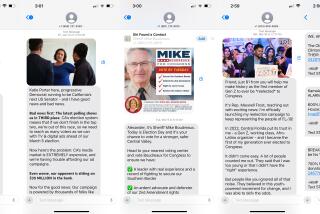Column: Think twice before filling out Congressional Monitor survey
- Share via
The official-looking letter from Congressional Monitor gets right to the point: “The United States Congress is currently debating the vital issues of immigration reform, veterans’ healthcare and government spending levels.”
It instructs recipients to fill out the accompanying survey so that “the Democratic and Republican leadership of both houses of Congress know your position on these important issues.”
The letter apparently is being sent to homes throughout Southern California if not nationwide. I’ve heard from a number of people asking if the survey is legit. I too received the letter a few days ago – and have spent way too much time since then trying to figure out what Congressional Monitor is all about.
All I have to show for my efforts is a grudging respect for how well these guys have masked their trail. And a warning to others who may be tempted to make their voices heard to Congress via this mailer: Don’t.
“It’s not a real survey. This is very likely a list-building exercise.
— Jack Pitney, professor of politics at Claremont McKenna College
“It’s not a real survey,” said Jack Pitney, a professor of politics at Claremont McKenna College who studies political polling. “This is very likely a list-building exercise.”
That is, it looks like an attempt by someone to gather nuggets of information from consumers that can be sold to marketers, or possibly scammers.
The biggest red flag, Pitney said, is a request at the bottom of the survey for recipients to divulge their home, cell and work numbers.
“That may be the main thing they’re after,” he said. “Phone numbers are valuable.”
Jon Krosnick, a Stanford University social psychologist who specializes in polling techniques, agreed that the goal of the survey doesn’t appear to be informing congressional leaders.
“The questionnaire is too badly written for that,” he said. “On the other hand, there’s a big market for selling people’s phone numbers, especially if they’re not listed.”
See the most-read stories in Business this hour »
The survey has seven questions. Most are benign, such as “Do you favor tax incentives to encourage domestic energy production?” The most suspicious question is this one:
In light of the recent televised gun violence do you think Congress should:
(A) Let the states and communities decide what action is best
(B) Ban high-capacity magazines
(C) Increase mental health care and treatment of mental illness
(D) Do nothing
Notably lacking among those choices is gun control. Ammo control, yes, but not the actual firearm.
Congressional Monitor’s website offers few clues. It’s decidedly amateurish, built using WordPress, which is free publishing software favored by bloggers. There’s no privacy policy. No phone number. An email I sent to the site went unanswered.
The site says that survey results “go to a collection center, are data entered and then sent to the leadership of both houses of Congress, and also used for various marketing research purposes.”
That last bit, of course, opens the door wide to all manner of privacy problems.
The address on Congressional Monitor’s cover letter is a Washington, D.C., post office box. The postage-paid envelope for returning the survey is addressed to a post office box in Virginia. The website provides a Washington, D.C., street address as Congressional Monitor’s “address of record.”
Bizapedia says that’s the address of Corporation Service Co., which acts as a registered agent for Congressional Monitor and numerous other businesses that may not want exposure to sunlight. No one at Corporation Service Co. returned my call. Congressional Monitor uses a separate agent for its website registration.
However, some digging revealed that the address is also home to the offices of Berman & Co., a Washington PR firm known for creating sneaky front groups that look like grassroots organizations but actually represent the interests of corporate clients.
I wrote last year about the so-called Center for Consumer Freedom, which purports to be “devoted to promoting personal responsibility and protecting consumer choices” but in reality does the bidding of the restaurant and beverage industries, among others. It’s run by Berman & Co.
“Nope, not us,” James Bowers, senior vice president of Berman & Co., said when I asked if his shop was behind Congressional Monitor. I believe him. Whatever else you want to say about the Berman crew, they stand behind their work.
After looking at the survey and Congressional Monitor’s website, Bowers said the production value and questions were too slapdash for a serious effort at influencing people’s thinking – what’s known in political marketing as “push polling.”
“Anyone who knows us would see that this is below our standards,” he said.
By the way, don’t confuse the survey with a Congressional Monitor website run by the Institute for Palestine Studies. The institute’s site “tracks every legislative initiative introduced in the U.S. Congress that mentions Palestine or Israel or has bearing on the Arab-Israeli conflict.” A spokesman said there’s no connection.
Bowers’ guess is that the survey represents a clumsy attempt by someone to gather just enough data from consumers to be of interest to marketers and to then sell the information at bargain-basement prices.
“The questions about energy, for example, they could help identify people who might be supportive of energy companies,” he said. “And it’s definitely a thing that they’re asking for phone numbers.”
If nothing else, the fact that whoever’s behind Congressional Monitor has worked so hard to stay hidden speaks for itself.
I asked each expert I spoke with what people should do if they get one of these surveys in the mail.
Their answers were unanimous: Throw it away.
David Lazarus’ column runs Tuesdays and Fridays. He also can be seen daily on KTLA-TV Channel 5 and followed on Twitter @Davidlaz. Send your tips or feedback to [email protected].
MORE FROM DAVID LAZARUS
Now on Starbucks’ menu: Less health coverage
Big companies pad their bank accounts instead of passing the savings to consumers
Cutting healthcare costs shouldn’t be this painful
More to Read
Get the L.A. Times Politics newsletter
Deeply reported insights into legislation, politics and policy from Sacramento, Washington and beyond. In your inbox three times per week.
You may occasionally receive promotional content from the Los Angeles Times.











